How to Jack Up a Boat Trailer
As you have no doubt just realized, jacking up a boat trailer is not always as easy as you might think. When you research it you are also going to find two different meanings. Do you want to jack up the boat trailer to lift or lower it for towing? Or do you want to jack up the boat trailer to change a tire? Same language, totally different meanings and tools. You need to know more than just how to handle a boat winch to do this right.
What Kind of Trailer Jack Do You Need?
Let’s start with tire changes. Most of us learned at some time or other how to jack our car up. You get a flat on the ride, you pull the jack from the trunk, and it’s a pretty easy process. But boat trailers and cars are definitely not the same thing. The clearance is very different. A boat trailer with a flat rides incredibly low. Figuring out how to get the jack under it and in the right spot is not all that intuitive. So don’t feel bad if you’re not sure how to manage it at first. Let’s check out the proper steps for jacking up that boat trailer.
Boat Trailer Frame Not Boat Trailer Axle
The most important piece of advice we can give you is to avoid the axle. If you try to jack the boat trailer up by the axle, it can end badly. You risk doing serious damage to the axle when you put that much stress on it. In addition, you will probably cause damage to the leaf springs. Stick to the trailer frame.
Even if there is no clear sign of damage at first, you could end up warping the axle in a serious way. If you’ve never dealt with a broken axle, trust us, you don’t want to. You can’t bang out the damage in an axle at all. Once it’s done, it needs to be replaced.
A broken axle will cost some cash to replace. Worse, however, is what it means if the axle breaks while you’re towing the boat. If that were to happen, you risk dragging the hull of the boat down the road. This could go for a distance as the boat trailer breaks down underneath it. That could cause serious damage to the boat and your tow vehicle. So remember, even if it seems like the easiest and most secure place to jack up the trailer, don’t do it. Always avoid the axle.
What you want to do is jack up the trailer frame. Get your jack situated near the leaf springer hangers along the frame. You can get most jacks into this space to get the trailer lifted. Use jack stands for added stability here as well. Especially if you aren’t confident in your jack. You want a jack stand that can handle some serious weight.
If you have a torsion bar axle and not a leaf spring, the process is going to be a little different. Torsion bar axles are harder to work with. You have to jack up a torsion axles higher than leaf spring trailers.
Use the Right Trailer Jack
Not every jack is up to the task. You need to know the weight of your trailer plus your boat. If you want to block your trailer, consider a good quality tongue jack. A floor jack is good for just changing a tire when you blow one on the road. A bottle jack can handle this job as well, as could a scissor jack.
We always recommend caution and safety when doing something like this. For that reason, you want to invest in a good quality jack if you can. You may be looking at around 3 tons of weight or more here. A bass boat and trailer weighs about 2,300lbs. It’s easy to find a jack that has a 6,000lb capacity. Some will also have a built-in stand for extra security and reliability. This can handle the load safely where other jacks may fail.
How to Use a Jack to Change a Tire
If your tire blows on the road, you need to take a touch more precaution than you would when changing a car tire.
- Pull over where you have plenty of space to see and be seen.
- Place the jack under the trailer frame and raise the trailer until the flat is clear enough to be removed. If you have a boat on the trailer at the time, you may need a wood block. You’ll still want to raise the frame and not an axle. But the wood block can held add stability and height.
- Chock the tire that is not flat to ensure nothing slips by accident.
- Proceed to remove the tire as normal. Take off the lugs and keep them secure as you remove the tire.
- Replace the tire with the spare and re-secure the lug nuts.
- Lower the jack and stash the flat tire.
As you can see this is almost the same as a typical tire change. You just need to make sure you have the space to do it. Also that you’re lifting the frame, and keeping your tire chocked.
Jacking up a Trailer to Attach to a Tow Vehicle
If you’re not changing a tire, then you need a tongue jack for the front of your trailer. Sometimes you’ll see these called hitch jacks. The name tongue comes from the front of the trailer, which is actually called the trailer tongue. The hitch jack gets its name obviously from the fact it attaches to the trailer hitch.
You need to attach the trailer to your tow vehicle so that’s what these do. You’ll also need to get it off again safely when you’re done towing. A good quality tongue jack can raise and lower your trailer quickly and easily. It will also safely hold it level when the trailer is not attached to a hitch.
Unlike a jack for changing trailer wheels, a boat trailer jack often will just look like a small wheel attached to a metal pole. Sometimes there’s no wheel and instead it’s just a flat plate of steel. These tongue jacks can either be manual or electric.
Manual Trailer Jack
For most boat trailers, a manual jack will work just fine. Electric jacks tend to be better suited to heavy trailers. Manual jacks rely on your strength to get them moving, just like any other jack. They tend to be pretty tough because there aren’t a lot of parts to damage. And you may consider the workout you get from using one to be a bonus as well. You will be putting in some effort with your arms and back here. Luckily, installation of these is easy.
The biggest selling point of a manual jack is the price. These can be much cheaper than electric trailer jacks. A good quality one can cost less than $200.
Using this kind of jack is very simple. Once it has been attached, it’s a simple matter of using the crank to raise or lower your trailer. We say simple but it can be time-consuming. Your arms and your back may get a pretty good workout here. It all depends on the size of your trailer and the kind of jack you have.
Electric Trailer Jack
You may want to use an electric trailer jack if you have a larger boat trailer. These are also great for boaters with disabilities and injuries. A manual jack can take a lot of work. These do the work for you so you can still enjoy your boat even if you can’t physically manage a jack.
An electric jack costs more than a manual jack but you may be surprised to learn it’s not that much. You can get some good quality ones for under $300. They are easy to install and use as well. Higher end models even had remote controls that help you auto level your trailer. Another big benefit is that most electric jacks are fully manual as well. If you don’t have power to operate it, you can still do it the old-fashioned way.
The downside is that yes, you need a power source. A 12V DC is standard. Like we said, they’re not super expensive, but they still cost more than manual jacks. If you need one for a larger boat trailer and a greater weight capacity, the price can get very high. Bay boats and trailers can get well over 5,000lbs. These may require triple axle trailers. But if you move that trailer around a lot, it could be a worthy investment.
If you can afford it we recommend an electric jack. They’re just easier to use and save time and strain. When you have no power, it’s still a manual jack so you never miss out. We also recommend getting a jack with a wheel for the base. They’re so much easier to use and maneuver than those with flat foot plates.
If stability is a concern because of terrain or weight, then a foot plate is a better option. If the boat trailer is going to be sitting in one place for an extended period of time, a plate is a better option as well. It provides a solid base on the ground.
Using an electric jack is as simple as pressing a button. Not much of a learning curve there. Some higher end models will have auto leveling, as we said. If there are extra bells and whistles, they shouldn’t be too hard to figure out.
Can I Go Without a Trailer Jack?
Spend enough time around the marina you’ll see a boater attach a trailer to their truck without a jack. There’s always one or two guys who just hoist one up by hand with the help of a buddy. Can you do that? Sure. Should you? No.
Boat trailers are heavy and clunky. They’re not gentle on human hands. If you have a small enough trailer and boat, then you may absolutely be able to maneuver one around. But unless it’s very small, we don’t think it’s worth the risk. A quick Google search can find you many stories of trailer accidents. More than one person has lost fingers to boat trailer accidents. Use a trailer jack to keep yourself safe. Saving a few seconds of time is not worth it.
Choosing the Right Size Jack
You have some specific size requirements you’ll need to keep in mind. These are going to depend on your trailer and your boat in specific.
When it comes to weight, a jack needs to be able to handle about 10% of the trailer’s total weight. There’s some wiggle room there, and some people will recommend it in a range between around 7% to 10%. In any event, that means you need to know the weight of your trailer and your boat combined. If they equal 6,000 lbs, then your jack has to handle 600lbs. Luckily, most jacks can handle well over that weight.
In terms of height, measure from the ground to the coupler. Do this on a level surface. If you’re on uneven ground, your measurements will suffer. You want this length to match the length of your trailer jack when extended.
Some people will say you can use a jack, especially one for changing a tire, even if the weight limit isn’t quite lined up. They claim that, as long as you’re fast, a smaller jack may work out for you. Please don’t do this. Never use a jack that is not rated to handle the size of your trailer. This can lead to a serious injury or worse.
Attaching Your Trailer To Your Tow Vehicle
Now that you have an idea of the trailer jack you need, what do you do with it? Every situation is different but in general, this is what you need to do.
- Start in a flat, open space. Park your tow vehicle and your trailer where you have room to move.
- Get your tow vehicle lined up with the trailer and then brake. Chock both of the tires at this point.
- Get your hitch and ball lined up. Once you have them in the right spot, use the jack to lower the trailer. You should be able to smoothly crank the jack down into place. If it’s electric, just press the down button.
- Make sure the trailer has secured latched onto the hitch. If it’s in place you can secure the latch and the pull pin. The pull pin is sometimes overlooked but it’s an important safety feature. You need to make sure this is done to prevent the trailer coming loose again. If you go over uneven ground without these secured, the hitch can pull out and the trailer will come free.
- Raise the jack and stow it away once it is secure.
Try towing the trailer a short distance to see how it hauls. Back the trailer up as well. If you notice it’s not even, you may need to lower it and retry. It’s possible that something is misaligned.
Keep Your Trailer Jack Safe and Secure
You can’t use your trailer jack if you don’t keep it working properly. Follow these tips to keep it working the way it’s meant to. That way you won’t have to deal with any problems down the road.
- Lubrication. A jack needs to stay lubricated or it will get rusty. Also no lubrication leads to friction. That will wear down the metal and cause parts to seize or break. Many jacks have a grease zerk where lubrication can be added. Don’t forget to keep the wheel lubricated as well. The last thing you want is that thing seizing up or even breaking off..
- Keep it stowed: When you’re towing the trailer, keep the jack out of the way. Sometimes you’ll see people letting it drag along like it’s an extra wheel on the trailer. Once the trailer is on the hitch, you should swing the jack up and out of the way. This will keep it safe.
- Storage: When you no longer need the jack for a season, have some care with winter storage. A cool, dry place is best. A designated shelf or drawer in the garage is always a good idea. Off the ground and away from moisture.
- Inspections: Always give your jack a quick once over before use. Look for any rust, dirt, or damage. Check the moving parts and the bolts. If anything is loose or broken, make sure you address it.
The Bottom Line
Using a jack to raise and lower your boat trailer can be intimidating at first. If the load is uneven or not secure right you’ll need to try it again. But practice makes perfect and you should have the hang of it in no time. Just remember what we said about making sure you elevate the frame and not the axle. The temptation to jack up the trailer axles has caused a lot of boaters to ruin trailers in the past.
Take your time and remember to be safe. Get a friend or other boater to help you if you’re not 100% confident in what you’re doing. It’s best to ask for a hand and make sure everything is safe. You wouldn’t want to damage your truck or your boat by accident, right?
Categories: Boats
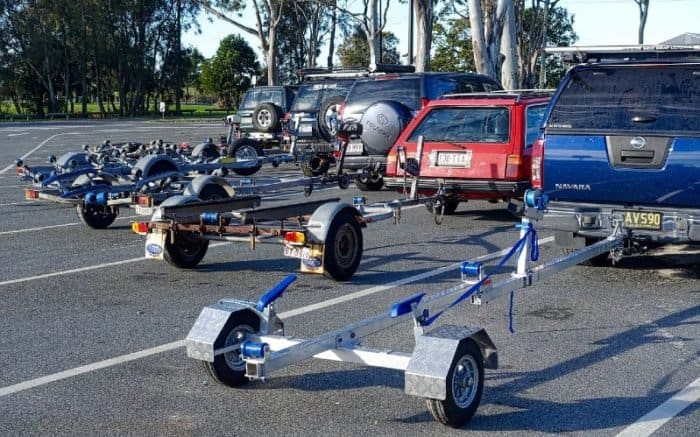
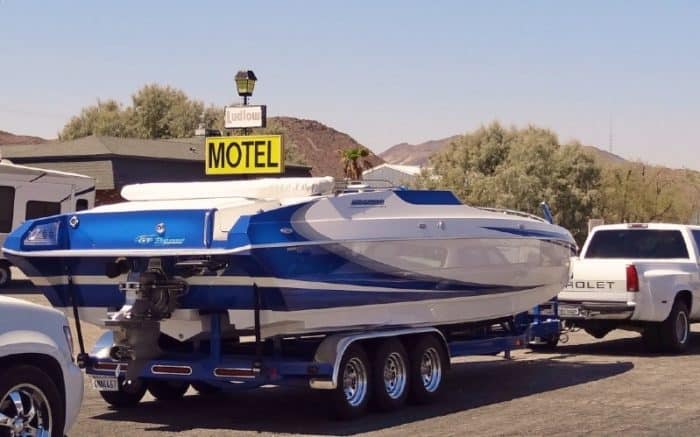
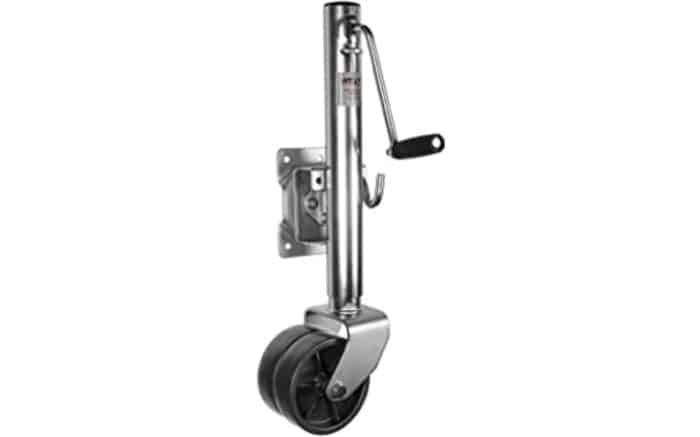
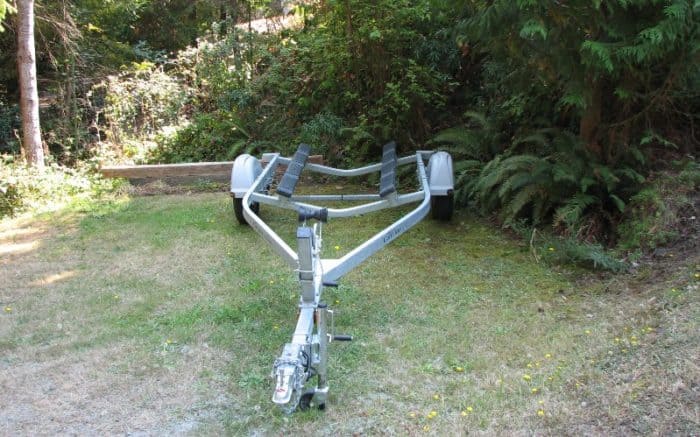
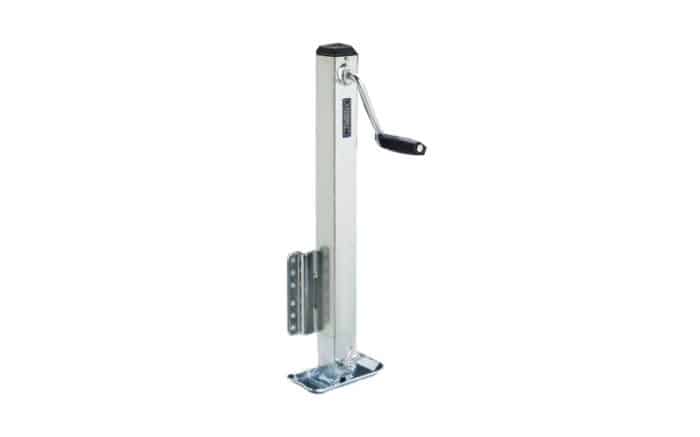


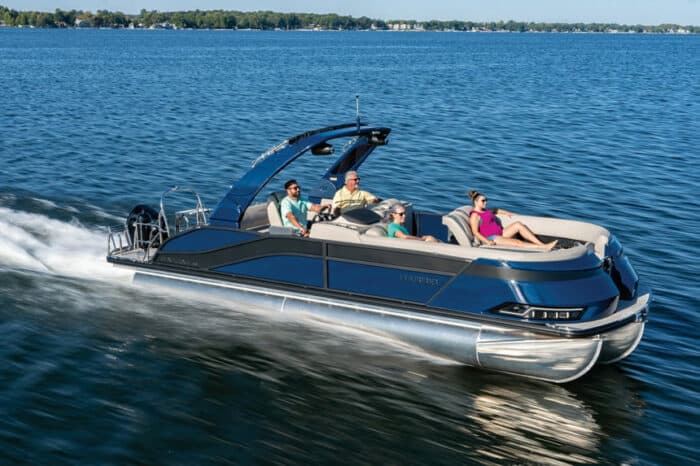






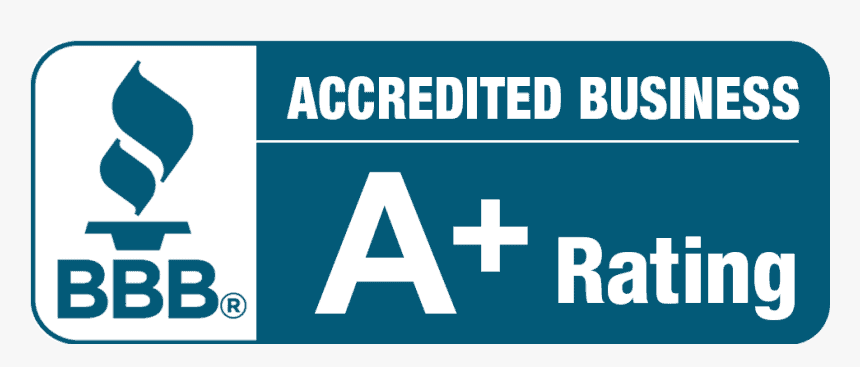


1 Comment
Dalton Bourne on November 16, 2022
Good info in these articles. My boat has straps, How do I lift a boat on this?